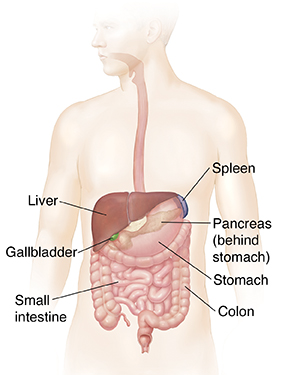Blunt Abdominal Trauma
Your belly (abdomen) extends from just below your chest to the top of your pelvis. It contains many vital organs, including your spleen, liver, pancreas, bladder, and stomach. These organs can be injured by the impact from a car accident or fall. Blunt trauma is an injury from a dull object or force. This type of injury doesn’t break through (pierce) your skin.

When to go to the emergency room (ER)
An abdominal injury can be very serious. For that reason, it's important to call 911 if you've had a blunt injury to your abdomen. You should be taken to the ER by trained medical staff in an ambulance. The effects of blunt trauma often don’t appear right away. So it’s important to see a healthcare provider after a hard blow to the abdomen, even if you feel OK.
What to expect in the ER
Your vital signs (temperature, breathing, blood pressure, and pulse) will be checked. You'll also be examined carefully for injuries. Severe trauma may need surgery right away. Otherwise you'll be watched closely for a time. You may also need to have 1 or more tests to find out the extent of your injuries. These may include:
-
Blood or urine tests. These may be used to check for problems.
-
X-rays. These imaging tests use radiation to take pictures of inside the body. They are mostly used to look for broken bones and problems with your heart and lungs.
-
CT scans. These use a computer and a special type of X-ray machine to give detailed pictures of the inside of your body. This can show problems with bones, as well as with organs such as your kidneys, spleen, liver, and stomach.
-
Ultrasound. This uses radio waves to make images of the organs in your abdomen. It can also quickly find internal bleeding if it's there.
-
Diagnostic peritoneal lavage (DPL). For this test, a needle and plastic tube (catheter) are put through the skin into your abdomen. This is to check fluid from your abdomen for signs of blood (internal bleeding). This procedure is rarely used anymore since ultrasound and other imaging have become so good at finding internal bleeding.
Based on the test results, you may be admitted to the hospital. Or you may have further care in the ER.
When to call your healthcare provider
After treatment, call your healthcare provider right away if you have any of these symptoms:
Call 911
Call 911or get medical care right away if any of these occur:
Online Medical Reviewer:
Eric Perez MD
Online Medical Reviewer:
Raymond Kent Turley BSN MSN RN
Online Medical Reviewer:
Ronald Karlin MD
Date Last Reviewed:
10/1/2021
© 2000-2024 The StayWell Company, LLC. All rights reserved. This information is not intended as a substitute for professional medical care. Always follow your healthcare professional's instructions.